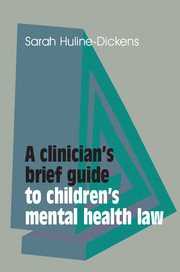Book contents
- Frontmatter
- Contents
- Foreword
- Acknowledgements
- List of cases
- Common abbreviations and terms
- 1 Introducing child mental health and the law
- 2 The rights of the child
- 3 The Children Act 1989 and the 2004 amendments
- 4 Consent to treatment
- 5 Confidentiality
- 6 The Mental Health Act
- 7 The Mental Capacity Act
- 8 Juvenile justice
- References
- Index
6 - The Mental Health Act
Published online by Cambridge University Press: 02 January 2018
- Frontmatter
- Contents
- Foreword
- Acknowledgements
- List of cases
- Common abbreviations and terms
- 1 Introducing child mental health and the law
- 2 The rights of the child
- 3 The Children Act 1989 and the 2004 amendments
- 4 Consent to treatment
- 5 Confidentiality
- 6 The Mental Health Act
- 7 The Mental Capacity Act
- 8 Juvenile justice
- References
- Index
Summary
The Mental Health Act 1983 (MHA) covers the reception, care and treatment of mentally disordered persons in England and Wales. For practical purposes, it is the legislation used when patients are admitted to, detained and treated in hospital without their consent. Using this legislation will be a familiar task to child and adolescent psychiatrists, even if an uncommon one. The politics and use of resources involved in the use of the Act are, however, sometimes fraught and complex. This is because, at the very least, detaining a young person requires a tier 4 bed, and although these have never been easy to find, it has now become very difficult. There has also been national concern in the past few years about the use of police cells in detaining children and young people on section 136 of the Act (see below).
The parliamentary debates on these subjects are interesting to follow. The reasons for the shortage of beds undoubtedly include increased demand and decreased capacity of local authority social care services and community CAMHS to deal with it, associated with changes in commissioning arrangements that make everything more complex. In England, NHS England took over commissioning of tier 4 in-patient services in April 2013. The House of Commons Health Select Committee has been critical of NHS England and the fact that it has failed to develop systems to manage the problem (Health Select Committee, 2014: Recommendations 11 and 12). Although further discussion of this is beyond the scope of this book, clinicians are uneasy about the practice of placing adolescents in in-patient beds often at great distance from their family homes. Surely, one would have thought, this must engage a young person's Article 8 right to family life.
Since the introduction of the Health and Social Care Act 2008, the Care Quality Commission (CQC) has had a specific responsibility for reviewing the use of the MHA in England. This includes inspecting, regulating and monitoring places where people are detained. The CQC also has a duty to appoint second opinion appointed doctors (SOADs) (Department of Health, 2015). The way this is done is constantly changing, and since April 2014 an MHA reviewer has been included in the inspection team. These were functions previously undertaken by the Mental Health Act Commission (MHAC), which operated in England and Wales and was abolished in 2009.
- Type
- Chapter
- Information
- Publisher: Royal College of PsychiatristsPrint publication year: 2016



